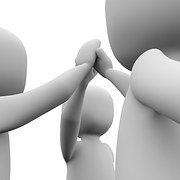Have you ever been paging through an article and stumble across a quote that just stops you in your tracks? Here’s one attributed to Adlai Stevenson that recently caught my eye. Stevenson was talking about political campaigns, but I think the idea can be applied to many situations. He said that the challenge was to not just win, but to win “without proving that you are unworthy of winning.” I think that sentiment speaks to integrity, grace, and fair-mindedness.
Recently some of my colleagues and I were at a retreat, sharing information about helping facilitators manage decision making and conflict in groups. I realized that Stevenson’s sentiment can also be applied to helping groups make decisions.
 One of the trickiest situations for a facilitator can be encountering and effectively handling disagreements among group participants. Making decisions in groups is difficult and often messy, but helping a group make complex decisions is one of the most important tasks of a facilitator. The lively discussion that is part of the group decision making process, however, often involves people who feel passionately about their ideas, and sometimes that passion can escalate to a discourse that is unhelpful at best, and can often be damaging to the group or individuals involved.
One of the trickiest situations for a facilitator can be encountering and effectively handling disagreements among group participants. Making decisions in groups is difficult and often messy, but helping a group make complex decisions is one of the most important tasks of a facilitator. The lively discussion that is part of the group decision making process, however, often involves people who feel passionately about their ideas, and sometimes that passion can escalate to a discourse that is unhelpful at best, and can often be damaging to the group or individuals involved.
The facilitator’s job is to create an environment where sharing a diversity of ideas is viewed as an important part of the process to create stronger, more sustainable solutions. In Facilitation at a Glance, a handy field guide to facilitation, the author, Ingrid Bens, highlights two different kinds of discussions that can occur among group members.
Bens describes productive disagreements as debates. In this type of conversation, individuals are open to the ideas of others – even when they may be different from their own. Everyone strives to understand the views and perspectives of the other group members, and remains objective and focused on the facts.
Arguments, on the other hand, are a type of discussion that is often unproductive, and may damage relationships and group momentum. According to Bens, in an argument, people assume they’re right and are often not really listening to the ideas of others. The discourse often results in personal attacks or blaming.
So how can a facilitator encourage a debate (and discourage an argument)? Bens suggests that a facilitator:
- remain neutral,
- restate differences so they can be understood,
- highlight areas of agreement,
- encourage folks to focus on the facts (not emotions or assumptions),
 slow down the discussion by encouraging individuals to paraphrase what they are hearing each other say and allowing only one person to speak at a time.
slow down the discussion by encouraging individuals to paraphrase what they are hearing each other say and allowing only one person to speak at a time.
Creating shared agreements can help groups reach the finish line with their integrity and friendships intact. When it comes to group decision making, debates that lead to compromise and collaboration are essential to helping group members be worthy of their win.
The content of this site is published by the site owner(s) and is not a statement of advice, opinion, or information pertaining to The Ohio State University. Neither text, nor links to other websites, is reviewed or endorsed by The Ohio State University.
 Becky Nesbitt is an Assistant Professor and Extension Educator in Community Development with OSU Extension. For more information about Becky and her educational efforts, visit here.
Becky Nesbitt is an Assistant Professor and Extension Educator in Community Development with OSU Extension. For more information about Becky and her educational efforts, visit here.
 So why do smart, well-intentioned people often struggle with making good decisions in groups? According to Sam Kaner, author of Facilitator’s Guide to Participatory Decision-Making, “the answer is deeply rooted in prevailing cultural values that make it difficult for people to actually think in groups.” Kaner explains that some of the obstacles to productive group interactions include a lack of good listening skills, a strong need to move to action without adequate consideration or discussion, and treating a difference of opinion as conflict that must be “stifled or solved.”
So why do smart, well-intentioned people often struggle with making good decisions in groups? According to Sam Kaner, author of Facilitator’s Guide to Participatory Decision-Making, “the answer is deeply rooted in prevailing cultural values that make it difficult for people to actually think in groups.” Kaner explains that some of the obstacles to productive group interactions include a lack of good listening skills, a strong need to move to action without adequate consideration or discussion, and treating a difference of opinion as conflict that must be “stifled or solved.” A facilitator can help a group move beyond the familiar, often unproductive, patterns of communication, and encourages a sense of shared responsibility, empowering group members to speak up, listen, and effectively participate in the process. According to Kaner, the group facilitator’s three core competencies include:
A facilitator can help a group move beyond the familiar, often unproductive, patterns of communication, and encourages a sense of shared responsibility, empowering group members to speak up, listen, and effectively participate in the process. According to Kaner, the group facilitator’s three core competencies include: Becky Nesbitt
Becky Nesbitt Countless scholars, experts and ordinary folks throughout history have touted the importance of building and maintaining trust. Noted educator and author, the late Dr. Stephen R. Covey, often wrote about its importance to relationship building. “Trust is the glue of life. It’s the most essential ingredient in effective communication. It’s the foundational principle that holds all relationships.” Covey continues, “When the trust account is high, communication is easy, instant, and effective.” When individuals trust each other, they have empathy for one another, forgive easily, and give each other the benefit of the doubt.
Countless scholars, experts and ordinary folks throughout history have touted the importance of building and maintaining trust. Noted educator and author, the late Dr. Stephen R. Covey, often wrote about its importance to relationship building. “Trust is the glue of life. It’s the most essential ingredient in effective communication. It’s the foundational principle that holds all relationships.” Covey continues, “When the trust account is high, communication is easy, instant, and effective.” When individuals trust each other, they have empathy for one another, forgive easily, and give each other the benefit of the doubt.